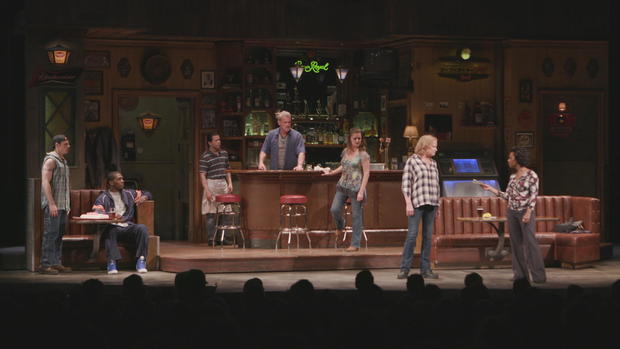"Sweat" playwright: "I felt like I was holding a hammer in my hand"
Sunday's Tony Awards is Broadway's biggest night, and while musicals usually get most of the attention, the play "Sweat" is up for three awards and has already won the Pulitzer Prize for drama.
The play captures, and some say predicted, a number of the most important and divisive issues of our time, such as race, class and immigration, reports CBS News' Jamie Wax.
Research, humanity and tremendous talent combine on stage in a powerful take on the plight of the American working class.
"Sweat" takes place almost exclusively inside a bar. It's the happy hour hangout of union workers in a Reading, Pennsylvania steel factory.
"I think for me the bar is a place where people unwind and people relax but I also think that liquor has this incredible power to get people to tell the truth," said Nottage, the playwright of "Sweat," which is directed by Kate Whoriskey.
"When I was writing the play, I really felt like I was holding a hammer in my hand. Just because I was so angry about the fact that there was this huge swath of America that was not being seen," Nottage said.
"Sweat" alternates between six years after the North American Free Trade Agreement became law and the 2008 aftermath of the world financial crisis.
That was a time of bailouts for car companies and big banks.
In 2011, the Occupy Wall Street movement drew thousands of angry Americans, including Nottage.
"And I spent probably another week or two -- going to Occupy Wall Street, and eventually felt like it wasn't enough. I needed to understand what was happening in our country. Why was our American narrative shifting so quickly?" Nottage said.
An article in the New York Times led Nottage 150 miles away to Reading, Pennsylvania.
"And it basically had said that Reading was the poorest city of its size," Nottage said of the article.
"When I began interviewing people, we always asked the question, 'How would you describe your city?" and people inevitably said, 'Reading was' -- that they always spoke of their town in past tense and that really sort of saddened and shocked me," Nottage said of what she discovered in Reading.
"You have this generational tension in which you had one generation that was so aspirational and achieved for so long that suddenly finds they can't pass that same bounty to their children," Nottage explained.
Whoriskey joined Nottage about a year later. Together they interviewed locals and visited places like Mike's Tavern. Eventually a narrative and characters began to emerge -- like Cynthia and Tracey.
The two best friends on the factory floor are played by Tony nominees Michelle Wilson and Johanna Day.
When asked if she sees echoes of her own life in the play, Wilson said, "Oh, for sure. I'm from Detroit. And I was saying that Detroiters were canaries in the coal mine ages ago. I mean, I remember the gas crisis and I remember them sending counselors into the schools because the children were depressed, because their parents were out of work. So I know intimately what it's like to come from a company town, a one-industry town."
When Cynthia receives a promotion, relationships begin to fray.
"This is the majority of the world, these people in this play," Day said of the drastic pay cuts announced at one point during the story.
"Sweat" was originally commissioned by the Oregon Shakespeare Festival. As the play moved from Oregon to the Public Theater in New York, the political landscape began to shift and intersect with the script.
"Certainly when we sat down and began speaking with people in Reading, we felt their anger and their frustration, we felt a sense of alienation. We felt all of the things that we're reading about today. And the question that we often get asked could we have predicted that the country would -- turn toward Trump -- it's like, no. But what we could predict is that this kind of frustration would take some form of revolution," Nottage said.
"In some ways, it was absolutely shocking. And in another way, we had access to the motor for five years. I mean, for five years, we were hearing the same stories and the same kind of anger and engine, and not realizing exactly where that -- that energy would go," Whoriskey said.
Since March, the production has been at New York's famed Studio 54 Theater. But before they made the move to Broadway, the cast put on a special performance for the people in Reading. The reaction was startling.
One woman told Johanna Day a startling story.
"She was in tears because she said, 'we're -- we're not just -- a block on the Monopoly board, and we're not the brunt of everybody's jokes. We're a play now,'" Day recounted. Wilson added, "She said, 'Thanks for not making fun of us.' It's just giving a voice."
Wax asked, "Why do you think these people have been invisible to much of America for so long?"
"There seems to be a resentment toward working, right? So there's something about the working class and just the dignity of labor, of getting up and taking care of your family, that seems to -- we have a disconnect, right? Like, the easier your money comes, the more worthy you must be and that, you know, you're not a sucker. And these people are not suckers. They're hard workers who are doing everything they're supposed to do to achieve the American dream," Wilson said.
Even though "Sweat" won Nottage her second Pulitzer Prize, the play marks her Broadway debut.
You can watch the Tony Awards, hosted by Kevin Spacey, Sunday night at 8 p.m. ET / 7 p.m. CT on CBS.





